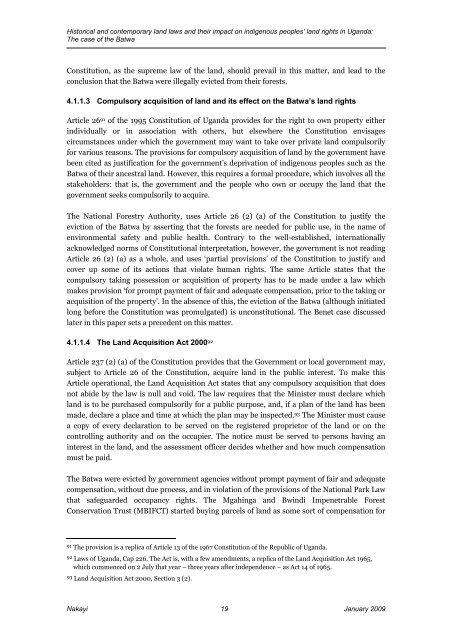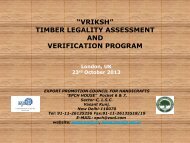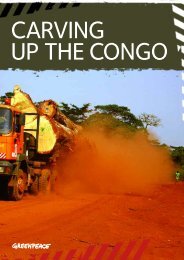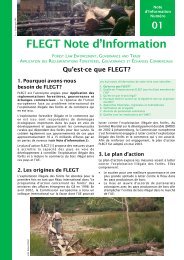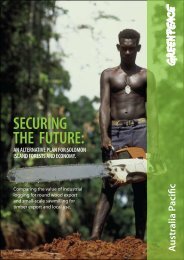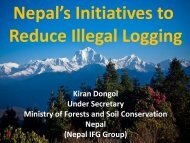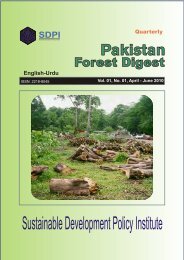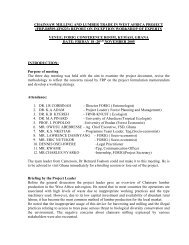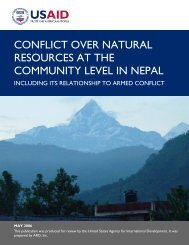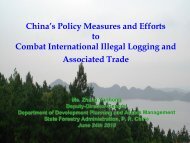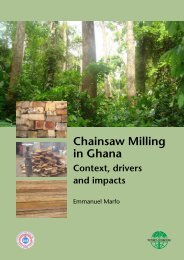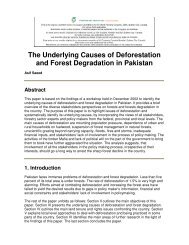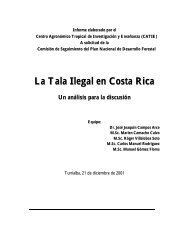download document - Rights and Resources Initiative
download document - Rights and Resources Initiative
download document - Rights and Resources Initiative
- No tags were found...
You also want an ePaper? Increase the reach of your titles
YUMPU automatically turns print PDFs into web optimized ePapers that Google loves.
Historical <strong>and</strong> contemporary l<strong>and</strong> laws <strong>and</strong> their impact on indigenous peoples’ l<strong>and</strong> rights in Ug<strong>and</strong>a:The case of the BatwaConstitution, as the supreme law of the l<strong>and</strong>, should prevail in this matter, <strong>and</strong> lead to theconclusion that the Batwa were illegally evicted from their forests.4.1.1.3 Compulsory acquisition of l<strong>and</strong> <strong>and</strong> its effect on the Batwa’s l<strong>and</strong> rightsArticle 26 91 of the 1995 Constitution of Ug<strong>and</strong>a provides for the right to own property eitherindividually or in association with others, but elsewhere the Constitution envisagescircumstances under which the government may want to take over private l<strong>and</strong> compulsorilyfor various reasons. The provisions for compulsory acquisition of l<strong>and</strong> by the government havebeen cited as justification for the government’s deprivation of indigenous peoples such as theBatwa of their ancestral l<strong>and</strong>. However, this requires a formal procedure, which involves all thestakeholders: that is, the government <strong>and</strong> the people who own or occupy the l<strong>and</strong> that thegovernment seeks compulsorily to acquire.The National Forestry Authority, uses Article 26 (2) (a) of the Constitution to justify theeviction of the Batwa by asserting that the forests are needed for public use, in the name ofenvironmental safety <strong>and</strong> public health. Contrary to the well-established, internationallyacknowledged norms of Constitutional interpretation, however, the government is not readingArticle 26 (2) (a) as a whole, <strong>and</strong> uses ‘partial provisions’ of the Constitution to justify <strong>and</strong>cover up some of its actions that violate human rights. The same Article states that thecompulsory taking possession or acquisition of property has to be made under a law whichmakes provision ‘for prompt payment of fair <strong>and</strong> adequate compensation, prior to the taking oracquisition of the property’. In the absence of this, the eviction of the Batwa (although initiatedlong before the Constitution was promulgated) is unconstitutional. The Benet case discussedlater in this paper sets a precedent on this matter.4.1.1.4 The L<strong>and</strong> Acquisition Act 2000 92Article 237 (2) (a) of the Constitution provides that the Government or local government may,subject to Article 26 of the Constitution, acquire l<strong>and</strong> in the public interest. To make thisArticle operational, the L<strong>and</strong> Acquisition Act states that any compulsory acquisition that doesnot abide by the law is null <strong>and</strong> void. The law requires that the Minister must declare whichl<strong>and</strong> is to be purchased compulsorily for a public purpose, <strong>and</strong>, if a plan of the l<strong>and</strong> has beenmade, declare a place <strong>and</strong> time at which the plan may be inspected. 93 The Minister must causea copy of every declaration to be served on the registered proprietor of the l<strong>and</strong> or on thecontrolling authority <strong>and</strong> on the occupier. The notice must be served to persons having aninterest in the l<strong>and</strong>, <strong>and</strong> the assessment officer decides whether <strong>and</strong> how much compensationmust be paid.The Batwa were evicted by government agencies without prompt payment of fair <strong>and</strong> adequatecompensation, without due process, <strong>and</strong> in violation of the provisions of the National Park Lawthat safeguarded occupancy rights. The Mgahinga <strong>and</strong> Bwindi Impenetrable ForestConservation Trust (MBIFCT) started buying parcels of l<strong>and</strong> as some sort of compensation for91 The provision is a replica of Article 13 of the 1967 Constitution of the Republic of Ug<strong>and</strong>a.92 Laws of Ug<strong>and</strong>a, Cap 226. The Act is, with a few amendments, a replica of the L<strong>and</strong> Acquisition Act 1965,which commenced on 2 July that year – three years after independence – as Act 14 of 1965.93 L<strong>and</strong> Acquisition Act 2000, Section 3 (2).Nakayi 19January 2009


